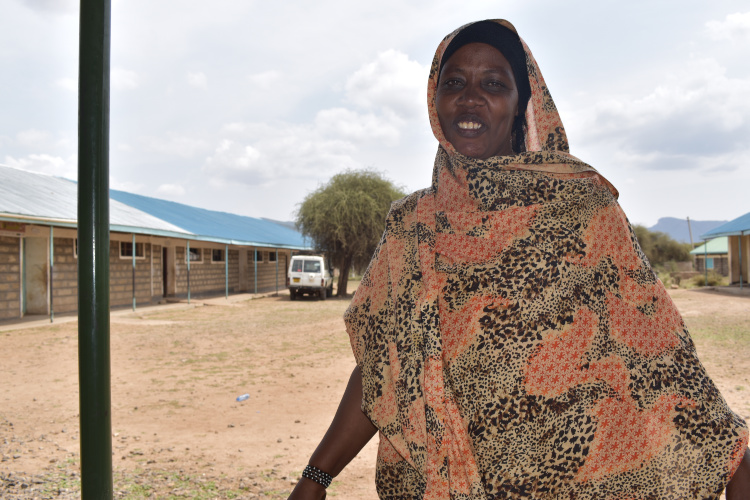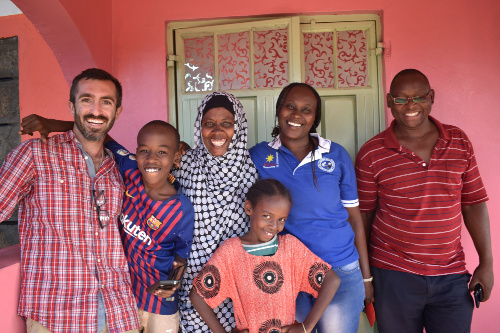How do we define romantic love (the love of those who we partner)? In the “west”, where market dynamics and individualism prioritize agency, we look for those feeling familiar to our culture of consumerism such as desire and immediate longing.
In my interview of Mwalimu (Teacher/Professor) Fatuma Dida, I learned of how love is contextual and cannot entirely be based upon personal agency and choice, but also happen stance. She celebrates her love, despite it not being of her choosing. Her husband of over 20 years chose her, went to her parents and requested her hand in marriage. She was married almost a week afterwards.

The life of Mwalimu Fatuma Dida has so far been a mix of tragedy and celebration. Married in her early twenties to a man she barely knew, she became a teacher at the school where my organization (Children Peace Initiative Kenya) established this past week’s peace exchange. The exchange occurred between two communities: Aremiet and Kambi Garba. Aremeit is predominately Christian, Turkana, rural, and economically homogeneous. Kambi Garba, the peri-urban village bordering the town of Isiolo, is predominately Muslim, Borana, and economically heterogeneous (with devastating poverty juxtaposed to lower-middle class wealth). The difficulties and triumphs of the peace exchange require far more depth than this piece will allow, but the five days I spent in Kambi Garba taught me much of how to integrate communities and build a lasting peace.
The conflict between these two communities between 2010 and 2014 was intense and largely caused by severe ecological events. Drought forced two bordering communities into conflict over land and resources. Surprisingly, these communities never had a history of conflict. Intermarriage, trade, and shared land use was common among the bordering villages. However, the late 2000s were accompanied by severe droughts. The unprecedented droughts left cattle and goats dead as water scarcity plagued the region. By 2010, cattle raiding became a regular event, and casualties were escorted by livestock theft.
Mwalimu Fatuma Dida was personally affected by these events. Her step-brother was killed in a raid that cost her 86 heads of cattle (an enormous sum in any country). Despite her loss, she has persevered. The love of her six – and soon to be 7 – children, as well as that of her husband, has been a firm pillar in her life. In fact, when I asked her about these losses during the conflict between the communities, she responded with a paraphrased quote from the Quran, “wealth is like a cloud, it comes, and it passes”. However, unlike wealth, the love we build, like a house, can withstand whatever weather may come.

So, as we explore individualism and identity in the “west”, evangelizing the world on what it means to be individually free, maybe we should think about the houses we are building. Maybe, by imposing our norms, whether it pertain to love, politics, or economics, we may be forgetting the importance of context. Love may be more than a feeling, it may encompass an array of responsibilities that keep individuals persevering and communities strong.
Posted By Benjamin Johnson (Kenya)
Posted Jun 26th, 2019


5 Comments
Abby Lahvis
June 27, 2019
It seems like you’re really embracing life in Kenya! Sounds like you’re learning a lot. I love the pictures.
Emily
June 27, 2019
Wow, what a powerful statement from Mwalimu. I really like the personal approach you take to your blogs. I look forward to seeing more of your work in Kenya!
Rachel Wright
June 27, 2019
I love how you relayed the story of Mwalimu while also calling into question the universality that western cultures often presume of certain values and ideas. Definitely looking forward to your future posts!
Sam Nass
June 28, 2019
This post really made me think. Great story, great commentary.
iain
July 2, 2019
Very thoughtful blog, Ben. Particularly interesting to read that this conflict was triggered by drought. A warning of what lies ahead for more and more peoples, and an example of why C PIK’s model is so important.